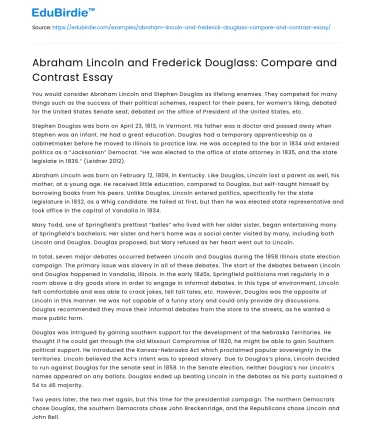You would consider Abraham Lincoln and Stephen Douglas as lifelong enemies. They competed for many things such as the success of their political schemes, respect for their peers, for women’s liking, debated for the United States Senate seat, debated on the office of President of the United States, etc.
Stephen Douglas was born on April 23, 1813, in Vermont. His father was a doctor and passed away when Stephen was an infant. He had a great education. Douglas had a temporary apprenticeship as a cabinetmaker before he moved to Illinois to practice law. He was accepted to the bar in 1834 and entered politics as a “Jacksonian” Democrat. “He was elected to the office of state attorney in 1835, and the state legislate in 1836.” (Leidner 2012).
Save your time!
We can take care of your essay
- Proper editing and formatting
- Free revision, title page, and bibliography
- Flexible prices and money-back guarantee
Abraham Lincoln was born on February 12, 1809, in Kentucky. Like Douglas, Lincoln lost a parent as well, his mother, at a young age. He received little education, compared to Douglas, but self-taught himself by borrowing books from his peers. Unlike Douglas, Lincoln entered politics, specifically for the state legislature in 1832, as a Whig candidate. He failed at first, but then he was elected state representative and took office in the capital of Vandalia in 1834.
Mary Todd, one of Springfield’s prettiest “belles” who lived with her older sister, began entertaining many of Springfield’s bachelors. Her sister and her’s home was a social center visited by many, including both Lincoln and Douglas. Douglas proposed, but Mary refused as her heart went out to Lincoln.
In total, seven major debates occurred between Lincoln and Douglas during the 1858 Illinois state election campaign. The primary issue was slavery in all of these debates. The start of the debates between Lincoln and Douglas happened in Vandalia, Illinois. In the early 1840s, Springfield politicians met regularly in a room above a dry goods store in order to engage in informal debates. In this type of environment, Lincoln felt comfortable and was able to crack jokes, tell tall tales, etc. However, Douglas was the opposite of Lincoln in this manner. He was not capable of a funny story and could only provide dry discussions. Douglas recommended they move their informal debates from the store to the streets, as he wanted a more public form.
Douglas was intrigued by gaining southern support for the development of the Nebraska Territories. He thought if he could get through the old Missouri Compromise of 1820, he might be able to gain Southern political support. He introduced the Kansas-Nebraska Act which proclaimed popular sovereignty in the territories. Lincoln believed the Act’s intent was to spread slavery. Due to Douglas’s plans, Lincoln decided to run against Douglas for the senate seat in 1858. In the Senate election, neither Douglas’s nor Lincoln’s names appeared on any ballots. Douglas ended up beating Lincoln in the debates as his party sustained a 54 to 46 majority.
Two years later, the two met again, but this time for the presidential campaign. The northern Democrats chose Douglas, the southern Democrats chose John Breckenridge, and the Republicans chose Lincoln and John Bell. A Democratic split occurred due to the issue of slavery in the territories, causing a Republican victory to be almost certain. Lincoln stayed home and avoided all public speeches for his “campaign” and allowed his supporters to speak for him, while Douglas campaigned fiercely.
In the end, Lincoln easily won. Throughout all the bitterness and fighting that occurred between the two, they did show a sign of friendship. At Lincoln’s inauguration, Lincoln had nowhere to set his cane and hat, so Douglas stepped forward to do so. Douglas died from typhoid fever on June 3, 1861, in Chicago, Illinois. Lincoln died from assassination on April 14, 1865.






 Stuck on your essay?
Stuck on your essay?

